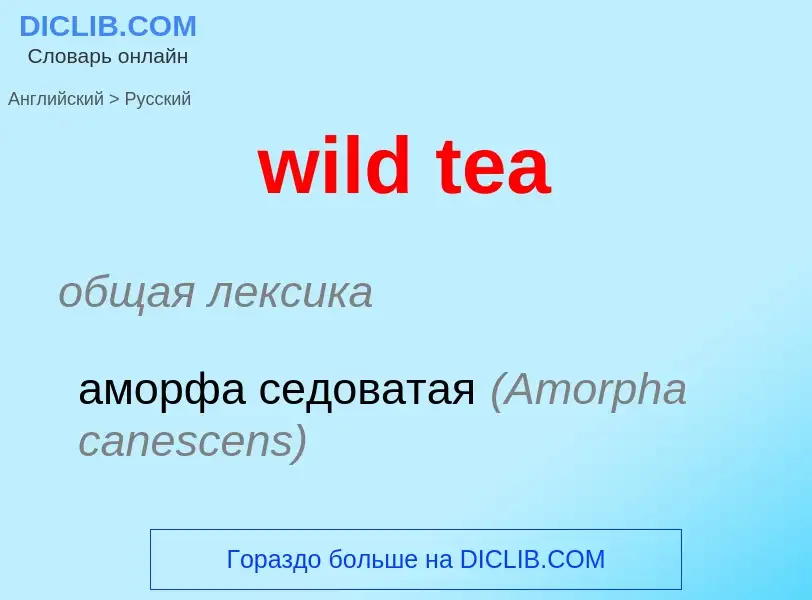Traducción y análisis de palabras por inteligencia artificial ChatGPT
En esta página puede obtener un análisis detallado de una palabra o frase, producido utilizando la mejor tecnología de inteligencia artificial hasta la fecha:
- cómo se usa la palabra
- frecuencia de uso
- se utiliza con más frecuencia en el habla oral o escrita
- opciones de traducción
- ejemplos de uso (varias frases con traducción)
- etimología
wild tea - traducción al ruso
общая лексика
аморфа седоватая (Amorpha canescens)
[kri:m'ti:]
общая лексика
пятичасовой чай с хлебом
топлёными сливками и вареньем
['ti:kəuzi]
существительное
общая лексика
стёганый чехольчик (на чайник)
стеганый чехольчик (на чайник)
Definición
Wikipedia

Khat or qat (Amharic: ጫት ch’at; Oromo: Jimaa, Somali: qaad, khaad, khat or chat, Arabic: القات al-qāt) is a flowering plant native to eastern and southern Africa. Khat contains the alkaloid cathinone, a stimulant, which is said to cause excitement, loss of appetite, and euphoria. Among communities from the areas where the plant is native, khat chewing has a history as a social custom dating back thousands of years analogous to the use of coca leaves in South America and betel nut in Asia.
The World Health Organization (WHO) classified it in 1980 as a drug of abuse that can produce psychological dependence, although the WHO does not consider khat addiction to be a serious problem.
The legality of khat varies by region. In many countries, khat might not be a specifically controlled substance but may nevertheless be illegal under more general laws. It is a specifically controlled substance in some countries including Canada, Germany, the United Kingdom, and the United States. By contrast, the production, sale, and consumption are legal in the nations where its use is traditional of those cultures, including Djibouti, Kenya, Uganda, Ethiopia, Somalia, Sudan and Yemen. In Israel, which hosts a population of Yemenite Jews, only the consumption of the plant's leaves in its natural state is permitted.


 (2782041206).jpg?width=200)
![DEA]] in July 2006 DEA]] in July 2006](https://commons.wikimedia.org/wiki/Special:FilePath/Deakhat.jpg?width=200)
![Harari]] men consuming khat in the street of [[Harar]], [[Ethiopia]] Harari]] men consuming khat in the street of [[Harar]], [[Ethiopia]]](https://commons.wikimedia.org/wiki/Special:FilePath/HarariMen.jpg?width=200)

![Man in [[Mogadishu]] dividing khat into bunches for guests in preparation for a long evening of tea, conversation and chewing Man in [[Mogadishu]] dividing khat into bunches for guests in preparation for a long evening of tea, conversation and chewing](https://commons.wikimedia.org/wiki/Special:FilePath/Khat 01.jpg?width=200)
![Khat cultivation in western Yemen near [[At Tawilah]] Khat cultivation in western Yemen near [[At Tawilah]]](https://commons.wikimedia.org/wiki/Special:FilePath/Khat fields in western yemen.jpg?width=200)
![Man chewing khat in [[Sana'a]], [[Yemen]] (January 2009) Man chewing khat in [[Sana'a]], [[Yemen]] (January 2009)](https://commons.wikimedia.org/wiki/Special:FilePath/Qat man.jpg?width=200)


![A cream tea in [[Boscastle]], [[Cornwall]], prepared according to the "Devon method". A cream tea in [[Boscastle]], [[Cornwall]], prepared according to the "Devon method".](https://commons.wikimedia.org/wiki/Special:FilePath/Cornish cream tea 2.jpg?width=200)

![An elaborate Coral Tea Cosy, crocheted to suggest the appearance of a [[Coral reef]] An elaborate Coral Tea Cosy, crocheted to suggest the appearance of a [[Coral reef]]](https://commons.wikimedia.org/wiki/Special:FilePath/coral tea cosy.jpg?width=200)

